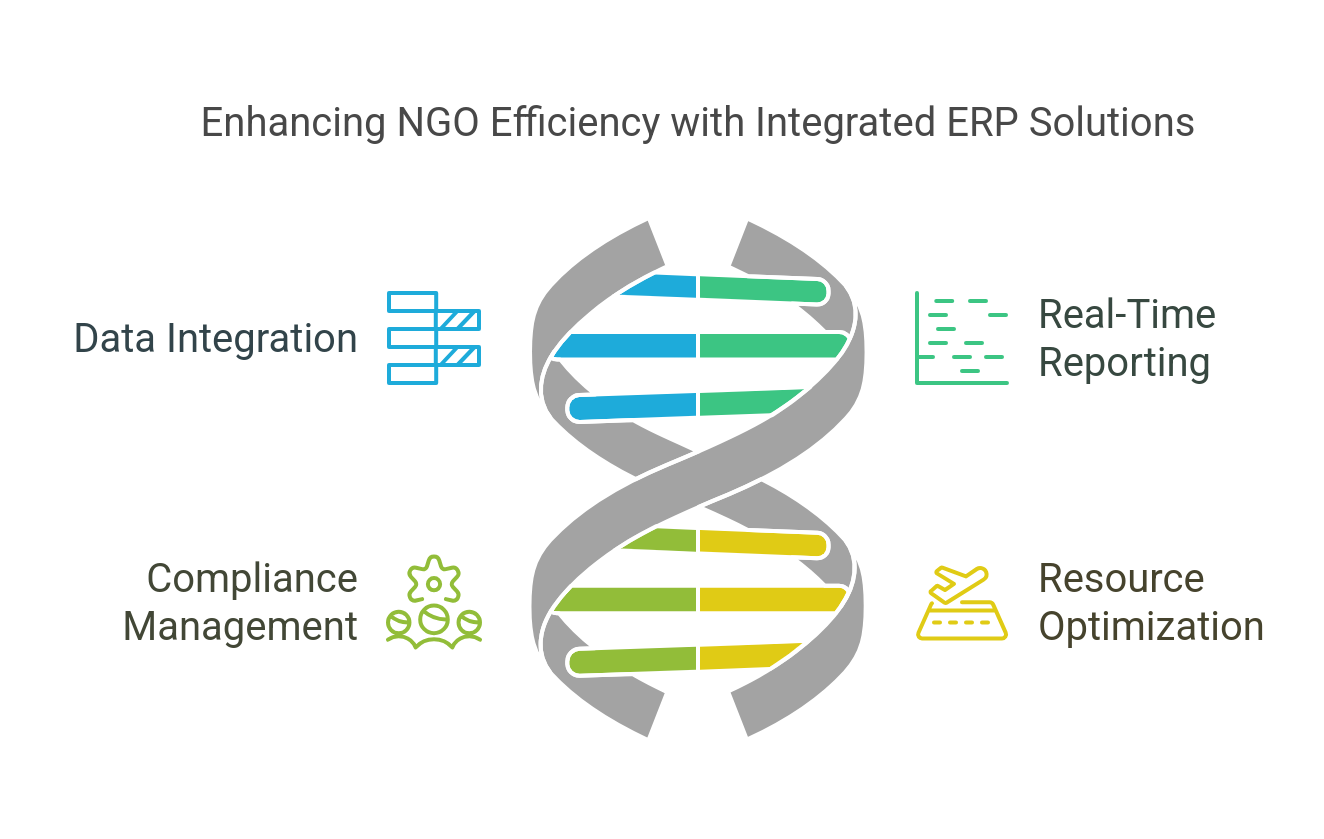NGOs are essential in tackling global issues, yet their operational intricacies—from handling donor funds to coordinating projects across multiple regions—require strong systems to maintain efficiency and accountability. This is where an NGO ERP system becomes vital. An NGO Management System, which is designed to improve workflows, transparency, and decision-making, has changed from a "nice-to-have" to a "must-have. In the following parts, we will discuss the most critical issues for NGOs and how individualized NGO ERP software provides practical solutions.
The Growing Need for an NGO ERP Solution
NGOs operate in dynamic environments with limited resources, making efficiency essential. Using older tools such as spreadsheets or disparate software will lead to data silos, reporting delays, and compliance violations. An ERP for NGO management integrates financial, operational, and donor data into one system, thereby providing real-time data and enabling much more informed strategic resource decision-making.

Key Challenges NGOs Face—and How ERP Solves Them
1. Fragmented Data and Inefficient Processes
Challenge: NGOs, are known to manage several systems, for finance, tracking donors, and programmatic management, which may lead to redundancy and errors.
Solution:
- Centralized Data Management: An NGO ERP package combines financial, donor, and project data in a single central repository, eliminating duplication and achieving uniformity.
- Automation: It automates invoice preparation, grant reporting, and payroll preparation jobs, for example, which reduces the manual hours of work needed and errors.
2. Donor Compliance and Reporting Complexity
Challenge: Donors demand strict adherence to fund usage guidelines, requiring detailed, audit-ready reports. Manual processes often fail to meet these standards.
Solution:
- Fund Accounting: Nurture limited and unencumbered money in real time to guarantee compliance with funders' recommendations.
- Customizable Reporting: Implement customized financial and impact reports for donors using predefined templates, which would facilitate audit processes and gain donors' trust by providing more transparency.
3. Limited Budgets and High Implementation Costs
Challenge: NGOs often operate on tight budgets, making upfront ERP costs daunting.
Solution:
- Phased Rollouts: Prioritize high-impact modules (e.g., financial management) first, spreading costs over time.
- Cloud-Based Solutions: Opt for scalable, subscription-based NGO ERP solutions to reduce infrastructure expenses.
4. Resistance to Change and Skill Gaps
Challenge: Staff with experience working in legacy systems may be reluctant to adopt new technology, especially where technical training is lacking.
Solution:
- Role-Based Training: Develop customized programs for finance staff, field staff, and management to enable an easy transition.
- Change Champions: Describe and identify technology-enabled champions among teams to increase participation via peer support.
5. Connectivity and Infrastructure Barriers
Challenge: Unreliable internet in remote or conflict-affected locations often makes it unfeasible to access cloud-based systems.
Solution:
- Offline Functionality: Deploy hybrid ERP models that sync data once connectivity is restored.
- Mobile Access: Enable field teams to input data via smartphones, reducing reliance on fixed infrastructure.
6. Regulatory and Multi-Currency Compliance
Challenge: Operating across borders introduces complexities like multi-currency transactions and varying tax laws.
Solution:
- Built-In Localization: Choose NGO ERP software with multi-currency support and automated tax compliance for different regions.
- Audit Trails: Maintain detailed logs of transactions to simplify cross-border audits.
Essential Features of an Effective NGO ERP System
When selecting an ERP for NGO Management, prioritize these features:
- Fund and Grant Management: Track restricted funds, subgrants, and budget vs. actuals in real time.
- Donor Relationship Tools: Centralize donor profiles, automate communications, and segment campaigns.
- Scalability: The module should adapt as the NGO expands, from volunteering management to global program development.
- Security: Be compliant with GDPR and IPSAS, introduce role-based access control, and encrypt for the protection of confidential data.
- Integration: Establish external tool connections, like CRMs or fundraising websites.
Conclusion: Transform Challenges into Opportunities
Implementing an NGO ERP Solution is a smart investment that tackles key operational challenges while building donor trust and ensuring long-term sustainability. By streamlining workflows, improving transparency, and offering valuable insights, NGOs can concentrate on what counts: maximizing their social impact.


